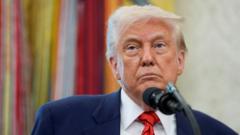Amid tensions in the region, Trump's recent actions indicate a new foreign policy direction that might reshape U.S.-Israel relations.
Trump Realigns Middle East Diplomacy, Leaving Israel in the Shadows

Trump Realigns Middle East Diplomacy, Leaving Israel in the Shadows
President Trump shifts focus in Middle East diplomacy, prioritizing relationships with other nations over traditional ties with Israel.
In a bold reconfiguration of American diplomacy, President Trump has set his sights on forging new relationships in the Middle East, effectively sidelining Israel from the forefront of U.S. foreign policy. During a recent state dinner at the Saudi royal palace, Trump was seen shaking hands with Syria’s new leader, Ahmed al-Shara, as he pledged to lift sanctions against the country—a significant shift considering al-Shara's controversial past and ties once associated with Al Qaeda.
Trump expressed his vision for Syria’s future, declaring that he aimed to "give them a chance at greatness," which stands in stark contrast to the apprehensions of Israeli Prime Minister Benjamin Netanyahu, who regards al-Shara as a "jihadist." Israel has been actively targeting Syrian positions, conducting hundreds of airstrikes since the recent upheaval that saw al-Shara's government rise to power.
Historically, U.S. foreign policy has prioritized and maintained a unique alliance with Israel, with Netanyahu often being a central figure in discussions regarding regional stability. This has been particularly evident over the past two decades of his leadership. However, Trump's words during a flight from Riyadh to Doha, dismissing concerns over Israel's diminished role, signal a potential shift in priority.
"This is good for Israel, having a relationship like I have with these countries, Middle Eastern countries, essentially all of them,” Trump remarked, seeking to reassure that his outreach to various Arab nations would not undermine Israel's security or interests.
The ongoing strategic realignment underscores a significant moment in U.S. relations with Israel and its neighbors—one that may have long-lasting implications in the geopolitics of the Middle East.





















